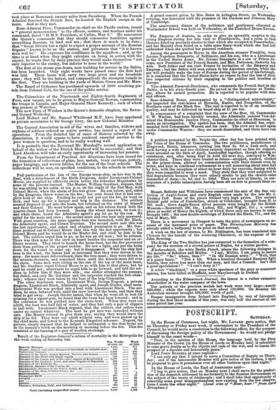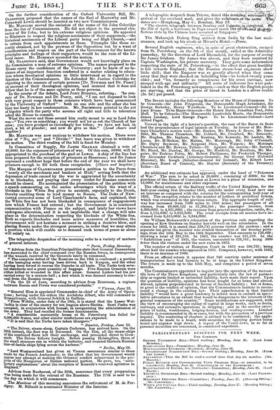POSTSCRIPT.
SiTUSIDAY.
In the House of Commons, last night, Mr. LAYAltD gave notice, that on Thursday or Friday next week, if convenient to the President of the Council, he would move a resolution to the following effect, for the purpose of discussing the foreign policy of the Government : he would not pledge himself to the exact words-
" That, in the opinion of this House, the language held by the First Minister of the Crown [in the House of Lords on Monday last] is calculated to raise grave doubts as to the objects and ends of the war, and to lessen the prospect of a durable and honourable peace." Lord Jonsr Russnut at once replied- " I can only say that I intend to move a Committee of Supply on Thurs- day; and if the honourable Member will give notice of his motion, I shall be prepared to give it precedence over all other business upon that nights"
In the House of Lords, the Earl of ABERDEEN said- " I beg to give notice, that on Monday next I shall move for the produc- tion of the despatch addressed by me formerly to the Russian Government on the subject of the treaty of Adrianople ; and I shall take that opportunity of removing some great misapprehensions now existing from the few observes tions I made the other night." (Loud cries of "Hear, hear !" from Lord Brougham.)
On the further consideration of the Oxford University Bill, Mr. Gyansrows proposed that the names of the Earl of Harrowby and Mr. Cornewall Lewis should be inserted as two new Commissioners.
Mr. MkNOLE8 moved the omission of the name of Sir John Coleridge from the list of Commissioners. He did not object to the personal cha- racter of Sir John, but to his extreme religious opinions. He appealed to Ministers to respect the religious sentiments of their supporters,—the historical sentiments of the Liberal party being not High Church,—and to refrain from such appointments as these. Triumphs like those re- cently obtained, not by the prowess of the Opposition but by a want of consideration and respect on the part of the Government for the known principles and feelings of their supporters, would be the ruin of the Li- beral cause. Mr. Holleman seconded the motion.
Mr. Gnensronn said, that Government would not knowingly place on the Commission a man of extreme opinions. The names proposed to the House carry the confidence of the University ; and he knew of no in- stance of an important function conferred in a matter relating to educa- tion where theological opinions so little intervened as in regard to the function of the Commissioners. He defended Mr. Justice Coleridge for objecting to the censure of certain persons [Dr. Newman and Dr. Posey] on account of their theological opinions, and insisted that it does not follow that he is of the same opinion as those persons.
In the course of the debate, Lord Joimt Russzu, referring L *he cen- sure of Dr. Newman and Dr. Pusey, said, "I am not disposed to look with very great respect to those censures which have been pronounced by the University of Oxford" : both on one side and the other she has been too hasty in her condemnation. Mr. DRUMMOND pointed to the act of bigotry which the party who assume all right and title to toleration asked the House to commit.
What the mover and those around him really meant to say to Lord John was—" You owe us something ; you would not let WI rob the Church of her rates; you have grudged us exceedingly her tithes ; we have not had, in short, a bit of plunder; and now do give us this." (Loud cheers and laughter.) Mr. MANGLES was now anxious to withdraw his motion. There were cries of "No no!" and "Divide ! " but leave was given to withdraw the motion. The third reading of the bill is fixed for Monday.
In Committee of Supply, Sir JAmns GRAHAM obtained a vote of 20,000/. for the expenses of prisoners of war. Of this sum, 50001. will be appropriated to the purchase of the gaol at Lewes. A ship of the line has been prepared for the reception of prisoners at Sheerness ; and Sir James expressed a confident hope that before the end of the year we shall have prisoners enough to fill both these receptacles. (Cheers and laughter.) The Marquis of CIANRICARDE presented a petition to the Peers from "nearly all the merchants and bankers at Hull," setting forth that the depression of trade caused by the war is aggravated by the uncertainty as to blockades, and praying that every- outlet for Russian commerce should be closed. He accompanied the presentation of the petition with a speech commenting on the undue advantages which the want of a blockade in the White Sea gives to neutrals, especially to the Dutch, thereby enabling them to lend money to Russia. The Duke of NEW- us= corrected some of Lord Clanricarde's facts, and explained, that the White Sea has not been blockaded in consequence of engagements into which France had entered ; but the Government is in continued communication with France on the subject, and lately her views have undergone alteration, and it is not improbable that a change will take place in the determination respecting the blockade of the White Sea. Both as regards blockades and more active measures of hostilities, the Government will not hesitate a moment in striking a decisive blow, and placing Russia under the strongest pressure, in order that we may attain a position which will enable us to demand such terms of peace as alone will satisfy us.



































 Previous page
Previous page